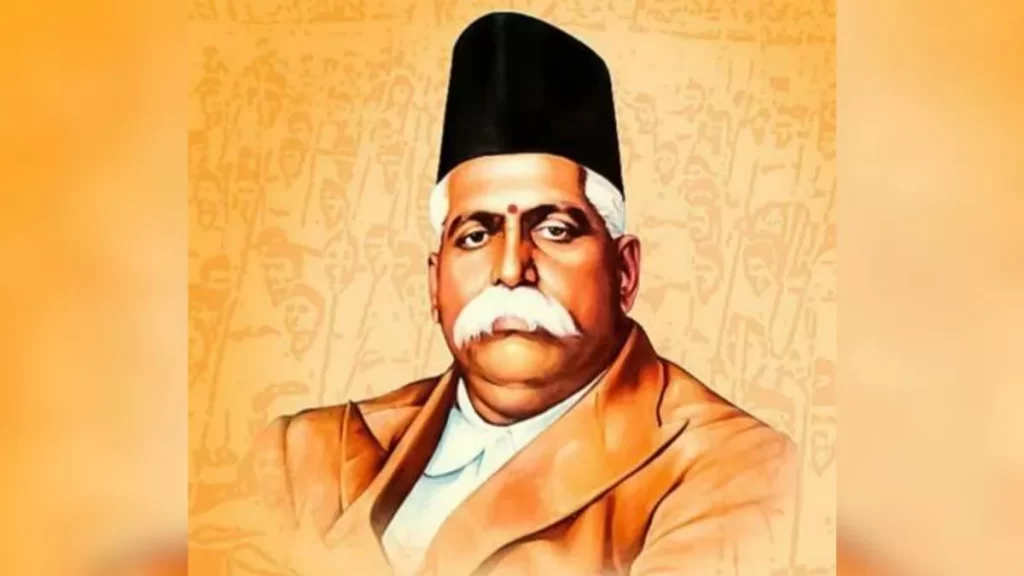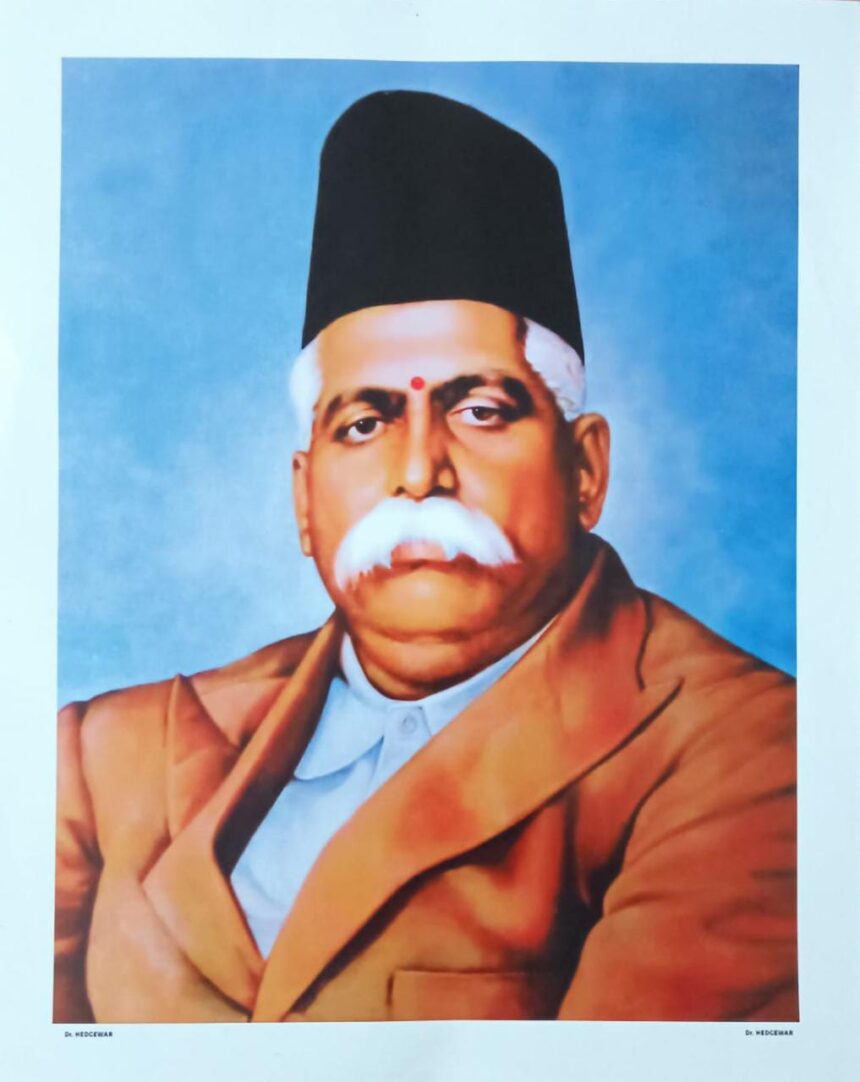Early Life and Ideological Roots of Dr. Keshav Baliram Hedgewar
Birth and Education
RSS Founde – Dr. Keshav Baliram Hedgewar, the founder of the Rashtriya Swayamsevak Sangh (RSS), was born in 1889 in Nagpur, India. He pursued a degree in medicine at Calcutta Medical College, where he encountered nationalist ideas that deeply influenced him. His exposure to these ideologies during his education played a pivotal role in shaping his future endeavors.
Dr. Hedgewar’s education not only equipped him with medical knowledge but also exposed him to the prevailing political climate, fueling his passion for nationalist movements.
RSS Founde – Influence and Freedom Struggle
Lokmanya Tilak, an influential freedom fighter known for advocating Swadeshi movement and Home Rule for India, had a profound impact on Dr. Hedgewar’s ideological development. The teachings of Lokmanya Tilak left an indelible mark on young Hedgewar’s mind, kindling within him a fervent desire to contribute to India’s struggle for independence.
Immersed in the spirit of nationalism and inspired by leaders like Lokmanya Tilak, Dr. Keshav Baliram Hedgewar actively participated in various activities during the freedom struggle against British colonial rule.
Founding of Rashtriya Swayamsevak Sangh by Hedgewar

Inaugural Shakha in Reshimbagh, Nagpur
The Rashtriya Swayamsevak Sangh (RSS) was founded by Dr. Keshav Baliram Hedgewar in 1925. The first shakha, or branch, was established in Reshimbagh, Nagpur. At these shakhas, young men gathered for physical exercises and games to promote physical fitness and cultivate a sense of discipline.
Dr. Hedgewar wanted to create an organization that would instill a sense of pride and responsibility towards the nation among the youth. He believed that through regular physical activities such as running, wrestling, and yoga at the shakhas, individuals could develop not only physically but also mentally and spiritually.
Emphasis on Physical Fitness and Character Building
The emphasis on physical fitness within the RSS aimed to build strong bodies as well as strong characters. By engaging in various physical activities at the shakhas, members learned about teamwork, leadership skills, discipline, and self-defense techniques.
Moreover, through discussions on Indian culture and history during gatherings at these branches across India’s cities and towns over time helped shape their understanding of nationalism based on Hindu cultural heritage.
Motivations Behind the Establishment of RSS
Response to Communal Tensions and British Rule
After witnessing communal tensions and the impact of British rule, Hedgewar felt compelled to establish a unifying force. He recognized that the disunity among Hindus was exploited by colonial powers, leading to social fragmentation. In response, he aimed to foster a sense of unity and solidarity within Hindu society through the establishment of Rashtriya Swayamsevak Sangh (RSS). By doing so, he sought to counteract the divisive tactics employed by external forces.
Hedgewar’s vision for RSS extended beyond addressing immediate communal tensions; it was also rooted in his desire for India’s independence. He believed that a united Hindu society would be better equipped to challenge British rule effectively. Through instilling values such as patriotism and self-discipline, he hoped to cultivate individuals who were not only committed to their nation but also possessed the moral strength necessary for achieving liberation from colonial oppression.
Uniting Hindu Society Under One Organization
The founding of RSS was driven by an earnest aspiration: uniting Hindu society under a single organizational umbrella. Hedgewar envisioned an organization that transcended caste divisions and regional disparities, fostering a cohesive identity centered on shared cultural heritage and national pride. This approach aimed at consolidating diverse segments of Hindu society into one collective entity with a common purpose – safeguarding India’s cultural integrity while striving towards independence.
RSS’s Role in the Indian Independence Movement
Civil Disobedience Movements
The RSS founder, Keshav Baliram Hedgewar, played a crucial role in various civil disobedience movements during the Indian independence struggle. He actively participated in protests and demonstrations against British colonial rule.
Hedgewar’s involvement in these movements showcased his dedication to fighting for India’s freedom from British oppression. His commitment inspired many others to join the cause for independence.
Support for Leaders
Keshav Baliram Hedgewar and the Rashtriya Swayamsevak Sangh (RSS) provided unwavering support to prominent leaders of the independence movement such as Mahatma Gandhi and Bhagat Singh. They rallied behind these influential figures, amplifying their messages of non-violent resistance and armed struggle against British rule.
The RSS stood firmly by these leaders, advocating their ideologies and methods for achieving independence. This steadfast support significantly contributed to shaping the narrative of India’s fight for freedom.
Dr. Hedgewar’s Stance on Hindu Nationalism and Non-Hindu Communities
Emphasis on Cultural Nationalism
Dr. Keshav Baliram Hedgewar, the founder of the Rashtriya Swayamsevak Sangh (RSS), emphasized cultural nationalism and advocated for the concept of Hindutva. This ideology focuses on promoting a sense of unity among people who identify with Indian culture, irrespective of their religious beliefs. It emphasizes the celebration and preservation of India’s rich cultural heritage.
His emphasis was not limited to religious boundaries but extended to encompass all those who identified with the Indian way of life, regardless of their faith. For instance, he believed that individuals from diverse backgrounds could come together under a common cultural umbrella while maintaining their respective religious practices.
Inclusion in Social Service Activities
One remarkable aspect of Dr. Hedgewar’s approach was his advocacy for inclusion rather than exclusion when it came to social service activities. He encouraged members to engage in various initiatives aimed at benefiting society as a whole, including non-Hindu communities.
For example, within the RSS organization itself, members were involved in charitable work that served people from all walks of life without any discrimination based on religion or caste.
This inclusive approach demonstrated an effort towards fostering harmony and cooperation among different groups within society.
Leadership and Shakhas: Organizational Structure of RSS
Hierarchical Leadership
The RSS founder, Dr. K.B. Hedgewar, established a hierarchical leadership structure with the Sarsanghchalak at the top. This leader is responsible for guiding the organization’s ideology and direction. Below the Sarsanghchalak are several regional leaders who oversee local operations and decision-making.
The presence of a clear hierarchy ensures that decisions can be made efficiently and consistently across different levels of the organization. It also provides a sense of stability and order within the RSS, allowing members to understand their roles within the larger framework.
Importance of Daily Shakhas
Shakhas play a crucial role in shaping the members of RSS by providing physical training, ideological education, and fostering camaraderie among participants. These daily gatherings serve as platforms for instilling discipline, promoting teamwork, and nurturing a strong sense of identity among its members.
By engaging in physical activities such as yoga or exercises during shakhas, participants develop physical fitness while also imbibing values like discipline and self-control. The ideological education provided during these sessions helps reinforce core beliefs held by the organization.
Decentralized Decision-Making
RSS emphasizes decentralized decision-making at local levels to ensure that communities have autonomy over their affairs while staying aligned with broader organizational goals. This approach allows for flexibility in addressing local issues based on specific needs without compromising overarching principles upheld by the organization.
Mission and Objectives of Rashtriya Swayamsevak Sangh
Promotion of National Unity and Integrity
The founder of RSS envisioned a united India, where people from all walks of life come together as one. The organization aims to foster a sense of belonging among Indians regardless of their diverse backgrounds. By promoting unity, the RSS strives to create a harmonious society where everyone respects each other’s differences.
RSS believes that national integrity is crucial for the progress and prosperity of the country. It encourages individuals to embrace their cultural heritage while respecting others’. This way, they contribute towards building a strong and unified nation.
Commitment to Social Reform Through Selfless Service (Seva)
One of the core objectives set by the RSS founder was to bring about positive social change through selfless service or ‘seva’. Members engage in various community service activities such as disaster relief efforts, environmental clean-up drives, and educational initiatives. Through these acts of kindness, they aim to uplift underprivileged communities and make a meaningful impact on society.
This commitment reflects the organization’s dedication to improving living conditions for all citizens. The RSS emphasizes empathy towards those in need and encourages its members to actively participate in humanitarian causes.
Nurturing Strong, Disciplined Individuals for Nation-Building
The RSS places great emphasis on developing strong individuals who are disciplined and dedicated towards nation-building. Its training programs focus on instilling leadership qualities, moral values, and a deep sense of responsibility in its members. By nurturing such individuals, the organization aims to contribute positively towards shaping India’s future leaders.
Through rigorous physical training exercises known as ‘shakhas’, members learn discipline, teamwork, and resilience – qualities essential for contributing meaningfully to society.
Social Service and Reform Initiatives by RSS
Relief Work
The RSS founder, Keshav Baliram Hedgewar, initiated the organization’s involvement in relief work during natural disasters. When floods or earthquakes strike, the RSS volunteers swiftly mobilize to provide aid and support to the affected communities. For instance, they distribute food, water, and medical supplies to those in need.
In addition to disaster relief efforts, the Rashtriya Swayamsevak Sangh also focuses on long-term initiatives for tribal welfare and rural development. They establish schools, healthcare facilities, and vocational training centers in remote areas to uplift these marginalized communities.
Campaigns Against Discrimination
Another significant aspect of the RSS’s social service is its campaigns against untouchability and caste discrimination. The organization actively works towards eradicating these social ills by organizing awareness programs, advocating for equal rights for all castes, and promoting inter-caste harmony through various community engagement activities.
Moreover, under the leadership of its founder Keshav Baliram Hedgewar and subsequent leaders like M.S. Golwalkar (Guruji), the RSS has been instrumental in spearheading movements aimed at fostering unity among diverse sections of society while addressing deep-rooted issues related to caste-based discrimination.
Death and Legacy of Dr. Hedgewar in Indian Politics
Succession and Influence
After the passing of Dr. Hedgewar in 1940, M.S. Golwalkar took over as the chief of the Rashtriya Swayamsevak Sangh (RSS). Despite his death, Dr. Hedgewar’s influence continued to reverberate through Indian politics. His teachings and vision shaped the trajectory of Hindu nationalism in modern India.
Dr. Hedgewar’s impact on the nationalist movement didn’t diminish with his demise; instead, it grew stronger posthumously. The RSS under Golwalkar’s leadership furthered its commitment to social service and reform initiatives, staying true to Dr. Hedgewar’s original vision for the organization.
The succession marked a pivotal moment in India’s political landscape as it ensured that Dr. Hedgewar’s ideologies were carried forward by his successor, thereby cementing his enduring legacy within not just the RSS but also Indian society at large.
Shaping Hindu Nationalism
Dr. Keshav Baliram Hegdewar laid down strong foundational principles for what would become one of India’s most influential socio-political organizations – shaping Hindu nationalism while emphasizing cultural pride and social responsibility.
Under M.S.Golwalkar’s leadership, these principles were further solidified into a cohesive ideology that resonated deeply with millions across India—shaping not only their political affiliations but also their sense of identity and belonging within a rapidly evolving nation.
Final Remarks
You’ve delved into the life and legacy of Dr. Keshav Baliram Hedgewar, uncovering the founding principles and evolution of the Rashtriya Swayamsevak Sangh (RSS). From its inception to its role in India’s independence movement, you’ve gained insight into the organization’s mission, objectives, and social initiatives. Dr. Hedgewar’s vision and the RSS’s impact on Indian politics are undeniable, shaping the nation’s socio-political landscape.
As you reflect on Hedgewar’s journey and the RSS’s contributions, consider how their ideologies and actions resonate in today’s context. What lessons can be drawn from their leadership, organizational structure, and societal endeavors? How might their principles guide contemporary movements and reforms? Take a moment to ponder these questions and explore how the principles of the RSS could inspire positive change in society today.








